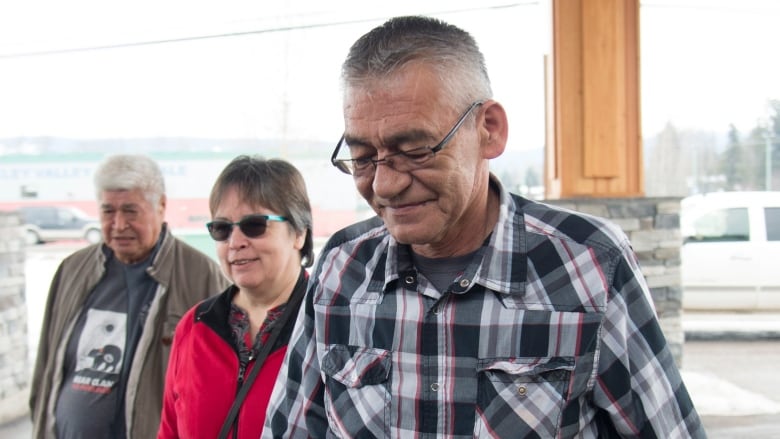Wet'suwet'en hereditary chiefs moving ahead with rights and title MOU with B.C. and Canada
Elected band chiefs called for negotiation process to be reset

The Wet'suwet'en hereditary chiefs say they're moving forward with signing a memorandum of understanding with B.C. and Canada on Thursday despite calls from elected band leadership to hit reset on the process.
The purpose of the MOU is to provide guidance to the Wet'suwet'en Nation, B.C. and Canada on how to recognize and implement Wet'suwet'en rights and title.
But in recent weeks, as news that the MOU would be signed started circulating, elected leadership of the bands within the Wet'suwe'ten Nation started calling for that plan to be halted.
Meetings were held, in response to those calls.
Then, on Monday, four of the six band chiefs sent another letter, asking again for the process to be reset and also calling for the resignation of Crown-Indigenous Relations Minister Carolyn Bennett.
It's unclear where elected leadership from the other two bands — Hagwilget and Witset — stands on the MOU since last week's meetings.
The MOU, as drafted, makes no mention of band councils. It instead speaks to the Nation's own governance structure that pre-dates Canada and the Indian Act — a structure that's built on the feast hall, house groups and clans, and Anuk nu'at'en (Wet'suwe'ten law).
On Tuesday evening, hereditary chief of the Tsayu Clan Na'moks said arrangements to sign the MOU would be going ahead as planned.
"This is exactly what Delgamuukw-Gisday'wa was about. Rights and title, authority, jurisdiction and I can see no reason for anybody to be thinking other than a positive on this," he said, referring to the 1997 Supreme Court of Canada decision that recognized the Wet'suwet'en and Gitxsan Nations never ceded title to their territories.
For the Wet'suwet'en, specifically, that territory covers 22,000 square kilometres of northern B.C. with specific areas held by different house groups.
Nation in agreement about importance of rights and title
Na'moks said elected leadership, who are also clan members, were invited to participate in talks about the MOU along with everyone else and said "it's unfortunate" they're now speaking out about the process.
"It was the clan membership that directed us to move forward," he said.
"We know exactly what our people had said. We took the minutes, we took the notes," he said.
He also said that nothing in the MOU impacts the existing rights of elected band councils, noting they "have jurisdiction and authority on a reserve but the territory belongs to the people."
While it's clear there is internal disagreement within the Nation about the MOU, it's also clear there's agreement it's important to pursue negotiations on rights and title.

"We take issue with the improper consultation with respect to an MOU which would lead to negotiations," states one of the letters sent written by elected leaders.
In a reply letter to band leadership, the hereditary chiefs acknowledged that yes, after the MOU is signed there will be negotiations.
But also stated that, "In those discussions, all Wet'suwet'en, including Wet'suwet'en members of your Bands and Band Councils will be invited to be fully engaged."
When asked about the tension between elected and hereditary leadership in recent weeks, Na'moks said "I think there's a misunderstanding -— this is only a MOU — it's not a final agreement or anything. It's to start a discussion on our rights and title."
The first line of the draft MOU commits Canada and B.C. to immediately recognize that "Wet'suwet'en rights and title are held by Wet'suwe'ten houses under their system of governance."
It then spells out what kind of negotiations will take place, over a three-month period, including "Legal recognition of Wet'suwet'en title as a legal interest in land by Canada and B.C." Other topics will be covered over a 12-month timeline.
Last week elected chief of the Wet'suwet'en First Nation, Maureen Luggi, said she's concerned about how quickly things are moving.
"We're not understanding what is the rush here," she told CBC News. "What is the reason that we're not doing things properly?"
The elected chiefs, including Luggi, also say that there are clan members who are upset about how things are unfolding.
In Ottawa, the federal government has not signaled any delay to signing the MOU. CBC was not able to reach the province in time for publication to find out if B.C. plans to move ahead as scheduled.
Now that the contents of the MOU are public, there are many specific elements to be looked at more closely. Absent in that document is any mention of the conflict that led to the document in the first place: the Coastal Gaslink conflict.
A backgrounder document circulated to Wet'suwet'en people about the MOU states that the governments weren't able to come to any conclusions about the Coastal Gaslink pipeline in their discussions, but notes, "the other two governments know that they will need to address the impact of [Coastal Gaslink] on the Wet'suwet'en territory."